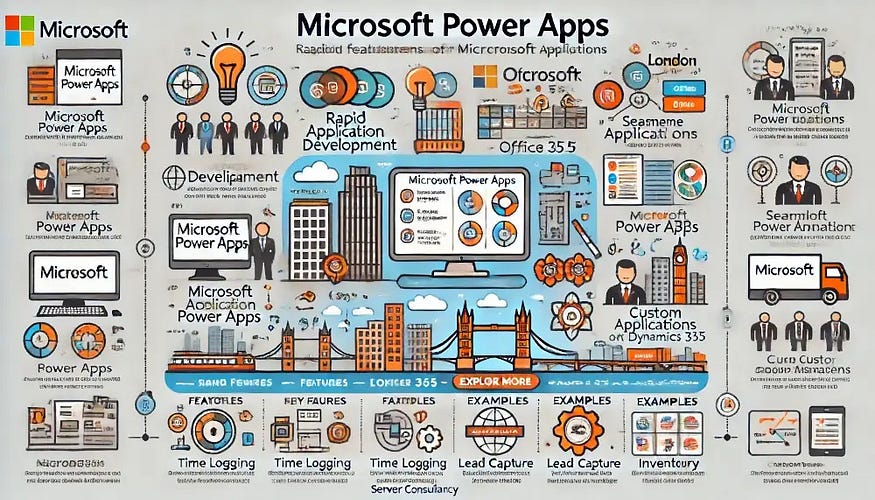In the current dynamic business landscape, adaptability and efficiency are crucial. Microsoft Power Apps, part of the Microsoft Power Platform, offers a low-code development environment that allows businesses to rapidly and effortlessly create custom applications. This article will explore ten powerful applications built with Microsoft Power Apps that can significantly enhance your business operations, particularly for London SMBs (small and medium-sized businesses).

What is Microsoft Power Apps?
Microsoft Power Apps offers a rapid application development environment comprising a suite of apps, services, connectors, and a data platform. It enables you to build custom applications tailored to your business needs. Microsoft Power Apps can be a notable change if you are to automate processes, streamline operations, or enhance customer interactions. Seamlessly integrating with Microsoft services such as Office 365, Dynamics 365 plans, and more becomes an invaluable resource for businesses of any size.
Benefits of Microsoft Power Apps
- Cost-effective: Reduce the need to hire advanced technical skills or outsource to developers.
- Agility: Quickly create and deploy apps tailored to your business needs.
- Integration: Seamlessly integrate with existing Microsoft services and other third-party applications.
- User-friendly: Designed for users with minimal coding experience, making app creation accessible.
10 Powerful Applications for Your Business
1. Time Logging
Tracking employee work hours can be a daunting task if done manually. A time-logging app built with Microsoft Power Apps simplifies this process:
- Create a SharePoint list to store time log data.
- Design an app where users can input start and end times.
- Connect the app to the SharePoint list and map controls accordingly.
- Add functionalities like buttons to start and end logs and a timer control to display elapsed time.
2. Lead Capture
Keeping track of potential customers is crucial for any business. A lead capture app ensures all leads are recorded consistently:
- Store leads directly in Microsoft Teams.
- Input lead data using pre-set fields.
- Validate entries to ensure leads are correctly categorised.
3. Expense Reporting
Manual expense approval is time-consuming and prone to errors. An expense reporting app can streamline this process:
- Customise a template to fit your specific needs.
- Enable features like email notifications and approval routing using Power Automate.
- Integrate with finance systems to automatically update approved and rejected expenses.
4. Billing Integration
For businesses that need to generate customer bills from various data sources, a billing integration app is invaluable:
- Convert call data from providers like BT, Gamma, and TalkTalk into customer bills.
- Automate the billing process to reduce manual input and errors.
5. Performance Review
Conducting performance reviews can be streamlined with a custom app:
- Pre-built fields for managers to evaluate goals and competencies.
- Sections for self-assessment and manager feedback.
- Centralised logs for performance review documentation.
6. Site Inspection
A site inspection app can significantly improve the efficiency of your inspection processes:
- Within the app, you can fill out checklists, capture photos, and obtain signatures.
- Use conditional logic based on inspection results (e.g., pass/fail).
- Secure data storage for inspection records.
7. Help Desk
Enhance your support operations with a help desk app:
- Raise support tickets with detailed issue descriptions.
- Central view of all open and closed tickets.
- Automate follow-ups to notify customers of ticket updates.
8. Desk Booking
In a hybrid working environment, a desk booking app ensures efficient use of office space:
- Book workspaces by location and availability.
- Capture booker details and update availability to prevent double bookings.
9. Sales Forecasting
A sales forecast app helps in predicting future financial performance:
- Input sales figures directly into the app.
- Centralised data view for all sales information.
- Predictive modelling using AI Builder for accurate forecasts.
10. Inventory Management
Stay on top of your inventory with an inventory management app:
- Track inventory items with detailed descriptions and quantities.
- Integrate barcode scanning for efficient item entry.
- Set up notifications for low stock levels.
Implementing Microsoft Power Apps in Your Business
To get started with Microsoft Power Apps, follow these steps:
- Identify Use Cases: Collaborate with your team to identify daily challenges or time-consuming manual tasks.
- Start Small: Begin with a simple app to test the functionality of Power Apps within your organisation.
- Scale Up: As you become familiar with the platform, develop more complex apps to address considerable business challenges.
- Seek Expert Support: Work with an MSP (Managed Service Provider) like Server Consultancy to guide you through the process.
Conclusion
Microsoft Power Apps offers a versatile and powerful platform to create custom applications that meet your business needs. The possibilities are endless, from time logging and lead capture to inventory management and sales forecasting. By leveraging the power of Microsoft Power Apps, London SMBs can enhance efficiency, reduce costs, and stay ahead in a competitive market.
At Server Consultancy, we specialise in helping businesses navigate, build, integrate, and train users on Power Apps. We aim to create time-saving, intuitive, cost-effective business applications that transform your processes. Contact us today to learn how we can help you harness the full potential of Microsoft Power Apps for your business.





Comments